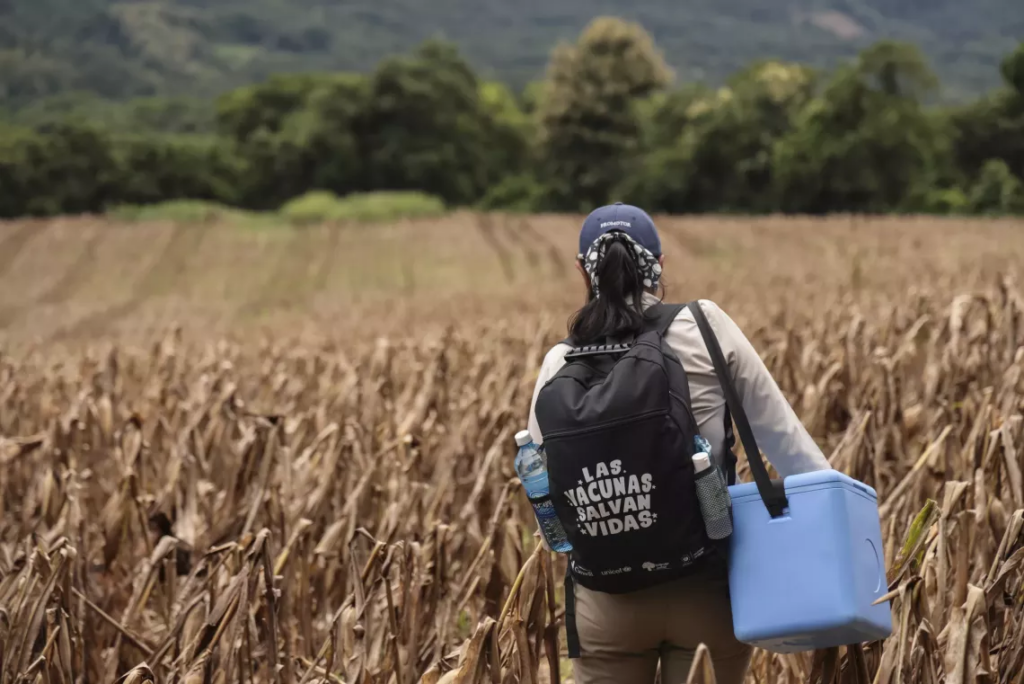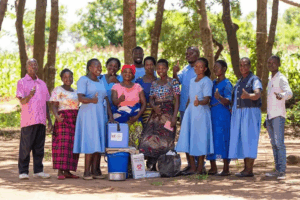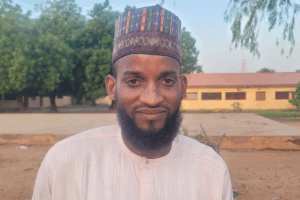The daily journey of a community health promoter to build resiliency, one vaccination at a time.

First published December 23, 2024 by UNICEF
The sun shines brightly on the dried maize leaves of a field in Guazapa, a quiet corner of San Salvador, El Salvador. Glenda Mejía, a 29-year-old community health promoter, parks her motorcycle and makes her way through the field, carrying a blue refrigerator bag. Inside, protected from the sun, vaccines are kept cool and safe until they reach children.
Her first stop is to Elida Flores and her family. Their house is too far from the regional health unit for regular check-ins. Glenda’s visits ensure that the family receives critical health information and care, including the delivery of vaccines that can make a life-changing difference.
Today, 10-year-old Angeline will receive a series of vaccines, including one against HPV. Being vaccinated is the most effective way to avoid HPV infection and can protect against the HPV strains that cause up to 90 per cent of cervical cancer cases.
Over 2.5 million women and girls above the age of 15 are at risk of cervical cancer infection in El Salvador.
The introduction of the HPV vaccine into the routine immunization system in 2020 was a critical step in protecting both girls and boys from HPV, but reaching every child remains a challenge.



After a decade of work in her community, Glenda began working as a health promoter three years ago through the Ministry of Health. She educates families on vaccine-preventable diseases, maternal and child health and the new vaccination schedule.
There were initial doubts in the community about vaccines, but Glenda’s steadfast approach has helped reduce fears and build trust. The Flores family has benefitted from her efforts, with all three children now up to date on their recommended vaccinations.

“Glenda always explains why it’s important to vaccinate our children, what diseases each vaccine prevents and how they protect us in the long term”, Elida Flores says. She adds, “I don’t want my children to suffer from diseases that can be prevented with vaccines.”
Now, the mother of three is a strong advocate for vaccination:
“I always tell my friends and neighbours how important it is to vaccinate our children.”
Glenda serves approximately 250 families in her region. With support from UNICEF, Glenda and other community health workers receive training and equipment to further the impact of her work. This includes items like motorcycles to reach remote areas, technology to help with data monitoring and specialized thermoses to maintain the cold chain for vaccines. These investments help community health workers to reach more families and expand their coverage.
“It used to be harder to coordinate vaccination campaigns because we didn’t have enough thermoses, and sometimes we couldn’t vaccinate everyone. Now, each promoter has their own team, which allows us to schedule more visits, bring more vaccines, track booster doses and assist families who can’t visit the health unit due to work or other daily obligations,” Glenda explains.
At another home, Glenda chats with Brenda Fuentes, a mother who faces challenges finding time to travel to the health unit due to work. Thanks to Glenda’s visits, 18-month-old Angie has been able to stay on schedule with her vaccines.

“Not even the rain stops them. It’s been raining heavily lately, but Glenda still came by to remind us that the date for my daughter’s vaccination was coming up and to have our vaccination card ready,” Brenda says.
Glenda logs the visit and data with her tablet. It is an important step that she can now do without having to return to the health unit, streamlining the process of recording and monitoring vaccination coverage.
While her daily journeys are long, Glenda’s work to reach children living in remote areas is making a difference one family at a time. Each vaccine given is a step toward a healthier, more resilient community.
Together with the Government of Canada, UNICEF aims to improve the quality of community immunization services by providing equipment and training to frontline vaccination teams, in collaboration with the Ministry of Health of El Salvador.
A version of this story was originally published in Spanish by UNICEF El Salvador.
Related Articles

In Rural Malawi, Malaria Might Have Wings but the Malaria Vaccine Rides a Bike
Distributing the four-dose malaria vaccine is a challenge for any public health system. In Malawi, vaccinators on bicycles are proving vital to the task. From Gavi, the Vaccine Alliance.

A Standout Voice Against Polio
For 25 years, Marguerite has walked the streets of Kisangani, DRC, calling on families to protect their children. From UNICEF.

“Seeing is Believing”: How Polio Survivors are Driving Immunisation in Northern Nigeria
In Sokoto State, Nigeria, a group of polio survivors is turning personal pain into powerful advocacy. From Gavi, the Vaccine Alliance.

These stories inspire me to make me a better person! Feels great to experience me as an activist in self-improvement just by reading “Angels in Medicine” each issue. Thank you for this!